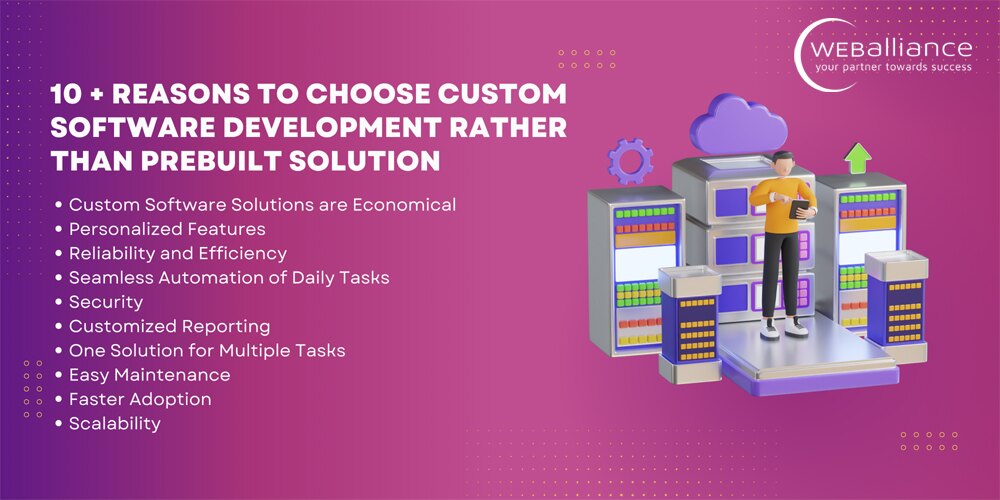What are the common features of custom database software?

As your business is unique, it makes perfect sense to invest in bespoke database development. With a database management system tailored to your specific needs, you can have complete control over your software’s features and specifications. This in turn allows for more secure and efficient handling of company data. Furthermore, a bespoke database system will enable you to minimise your expenses; because you can choose which features to include in your database, there will be no need to spend money on software functionalities your organisation will never use.
Essential Features To Incorporate In Your Bespoke Database
A high-quality database system will allow you to store, manage and maintain data quickly and efficiently. It will also have the capability of fulfilling all your company’s analytic, reporting needs. If you want a database system that will simplify your business tasks and generate a greater return on your investment, you must ensure it incorporates some of the following essential features.
1. Data normalisation
It is common practice for a number of different employees to be using a single database system at the same time. Although this facilitates the quick exchange and sharing of data, it also increases the risk of data duplication. For this reason, your database system must incorporate data normalisation.
Data normalisation helps mitigate the risk of having duplicate data, and prevents data anomalies and inconsistencies from appearing. By eliminating data redundancy, you can save on storage while improving access time.
2. Security protocols
With the growing number of identity theft cases in the UK, it is imperative that you protect the safety and security of not just your company’s data but your customers’ data too. This will help ensure the credibility of your business while preventing potential lawsuits at the same time.
No matter how many unique features and functionalities your custom database incorporates, it must have several security protocols to protect the integrity of the database and its data. Some of the recommended security protocols for your database include:
- Data encryption
- User authentication
- User authorisation
3. Data organisation
All the data stored in your custom database software should be structured in a clear hierarchical way to ensure ease of use. Every piece of information you enter into the database must be catalogued, making it easy for users to search and retrieve data. You should pay a close attention to what data you need to store when you're customising your database for your business.
4. Multi-user accessibility
It always makes perfect sense to install a database system that key members of your company will be able to access simultaneously. As discussed earlier, a custom database that several employees can use at the same time promotes efficient and convenient data exchange and entry. However, if you want to allow multiple people to use the software and access its data, you need to introduce measures to protect the security and integrity of your database. Here are a few examples:
To prevent data corruption, ensure that only one user at a time can edit the same piece of information.
Restrict certain users from seeing/modifying specific types of data, particularly sensitive information.
Ensure that only authorised users can access the database.
5. Query languages
Your database software should support the use of query languages, such as SQL, to collect, search and modify data, and to perform other relevant tasks. This will make it easier for you and your staff to retrieve and amend the records stored in the database.
6. Data backup
Besides having strong data security, your bespoke database software must also have a reliable backup system to protect your records against data loss. This should include a copy of files that you can easily retrieve or reconstruct in the event of original records being lost or corrupted. For optimum results, choose a database system that supports logical and physical data backup.
7. Easy-to-use UI
A high-quality bespoke database system will usually come with an easy-to-use user interface (UI). This will make it easier for your staff to enter, retrieve and modify data, whether they are tech-savvy or not. With a user-friendly database, your team can save time and effort, and this will in turn boost your overall business productivity and efficiency.
Obtain the Custom Database You Need
Having a database system tailored specifically to your needs is more practical and advantageous than investing in an off-the-shelf product. However, remember that the final product will ultimately depend on the skills and experience of the database developers you hire. There are a number of ways in which you can ensure that your custom database software will have everything you could ever need:
Hire a highly experienced database developer with a track record of excellence, such as our team here at Web Alliance.
Determine precisely what you need and the purpose behind your database. Then, ensure that you communicate this clearly to your database developers.
Keep in touch with your software developers during the development process so you are always up to date with the progress of the database and/or any difficulties that might arise.
Invest in a Custom Database Today
Investing in a database system tailored to your specific needs will do wonders for your business efficiency and advantages of database to your business, particularly if your company regularly handles a significant amount of data. However, you need to incorporate several essential features to ensure the optimum functionality and reliability of your database. By following the guidance outlined above, you will be able to build database software that will maintain the safety and integrity of your company’s data.
At Web Alliance, we specialise in building bespoke database systems for businesses of all sizes. If you require database solutions tailored to your specific needs, please contact us today so we can discuss your requirements.
Related Blogs

How much does it cost to hire custom software developers in 2024
Getting custom software is an increasing trend in all …

11 + Reasons Why Businesses Need custom software development rather than prebuilt solution
Custom-to-need process automation in businesses has become …

Why Does the Real Estate Industry in the UK Need Custom CRM Software
Why Does the Real Estate Industry in the UK Need Custom …


